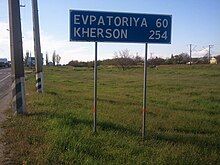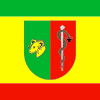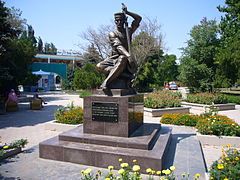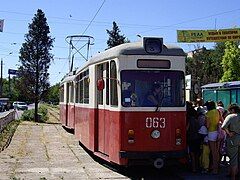Yevpatoria
You can help expand this article with text translated from the corresponding article in Ukrainian. (July 2022) Click [show] for important translation instructions.
|
Yevpatoria
| |
|---|---|
 Yevpatoria panorama | |
| Coordinates: 45°11′38″N 33°22′5″E / 45.19389°N 33.36806°E | |
| Country | |
| Autonomous republic | Crimea (de jure) |
| Raion | Yevpatoria Raion (de jure) |
| Federal subject | Crimea (de facto) |
| Municipality | Yevpatoria Municipality (de facto) |
| Area | |
• Total | 120 km2 (50 sq mi) |
| Elevation | 10 m (30 ft) |
| Population (2014) | 105,719 |
| • Density | 1,618.37/km2 (4,191.6/sq mi) |
| Time zone | UTC+3 (MSK) |
| Postal code | 97400 — 97490 |
| Area code | +7-36569 |
| Climate | Cfa |
| Website | my-evp |
 | |
Yevpatoria (Ukrainian: Євпаторія, romanized: Yevpatoriia; Russian: Евпатория, romanized: Yevpatoriya; Crimean Tatar: Kezlev, Кезлев; Greek: Ευπατορία, romanized: Eupatoría) is a city in western Crimea, north of Kalamita Bay. Yevpatoria serves as the administrative center of Yevpatoria Municipality, one of the districts (raions) into which Crimea is divided. It had a population of 105,719 (2014 Census).[1]
History
| Year | Pop. | ±% |
|---|---|---|
| 1897 | 17,900 | — |
| 1926 | 23,300 | +30.2% |
| 1939 | 47,030 | +101.8% |
| 1959 | 56,992 | +21.2% |
| 1970 | 79,444 | +39.4% |
| 1979 | 93,281 | +17.4% |
| 1989 | 107,792 | +15.6% |
| 2001 | 105,915 | −1.7% |
| 2014 | 105,719 | −0.2% |
| 2021 | 107,877 | +2.0% |
| Source: Census data | ||
Greek settlement
The first recorded settlement in the area, called Kerkinitis (Κερκινίτις), was built by Greek colonists around 500 BCE. Along with the rest of the Crimea, Kerkinitis formed part of the dominions of King Mithridates VI Eupator (r. 120–63 BCE). The name of the modern city derives from his nickname, Eupator ('of a noble father').
Khanate period
From roughly the 7th through the 10th centuries, Yevpatoria was a Khazar settlement; its name in Khazar language was probably Güzliev (literally 'beautiful house').[2] It was later subject to the Cumans (Kipchaks), the Mongols, and the Crimean Khanate. During this period the city was called Kezlev by Crimean Tatars and Gözleve by Ottoman Turks. The Russian medieval name Kozlov is a Russification of the Crimean Tatar name. For a short period between 1478 and 1485, the city was administered by the Ottoman Empire. Afterward, it became an important urban center of the Crimean Khanate.
The 400-year-old Juma-Jami Mosque is one of the many designed by the Ottoman architect Mimar Sinan. It was built in 1552-1564. 35-metre minarets rose on the flanks of the building. The mosque was of great state significance. It was here that a ceremony of the declaration of rights of the Crimean Khans was held at their enthronement. Only after that did they go to their capital, the city of Bakhchysarai.

Yevpatoria became a residence of the spiritual ruler of the Crimean Karaites, the Ḥakham. In this connection, a complex of two prayer houses was built under the supervision of the Rabovich brothers, in which the Renaissance and Muslim architectural styles entwined in a most unusual manner. The ensemble organically incorporates three courtyards. The entrance to it is marked by gates, built in 1900, which look like a refined triumphal arch.
Imperial Russian rule

In 1783, along with the rest of Crimea, Kezlev was captured by the Russian Empire. Its name was officially changed to Yevpatoriya in 1784. This spelling of the city name came to the French, German, Spanish, and English languages at the end of the 18th сentury.
Polish poet Adam Mickiewicz visited the town in 1825 and wrote one of his Crimean Sonnets here; it was later translated into Russian by Mikhail Lermontov.
The city was occupied in September 1854 by British, French and Turkish troops during the Crimean War prior to the Allied landing in Kalamita Bay, after which the Battle of the Alma south of the bay followed. It became a garrison of Ottoman troops later during the war and was the site of the Battle of Eupatoria in February 1855, which was the largest military clash in the Crimean theatre outside the Sevastopol area.
Soviet rule

Natural factors at Yevpatoria created beneficial conditions for the treatment of osteoarticular tuberculosis and other children's diseases; in 1933, at a scientific conference in Yalta, it was agreed that among Soviet resort towns for the organization of children's resorts, most people approved Yevpatoria. In 1936, the Soviet government placed the All-Union children's resort in Yevpatoria. In 1938, the approved plan of a general reconstruction of the city.
During World War II, sanatoriums were used as military hospitals. By 1 July 1945, Yevpatoria operated 14 sanatoriums, and have taken 2,885 people. By the 1980s, the city operated 78 sanatoriums for 33 thousand people.
Independent Ukraine and Russian annexation
This section needs to be updated. (January 2024) |
On 24 December 2008, a blast destroyed a five-story building in the town. 27 people were killed. President of Ukraine Viktor Yushchenko declared 26 December to be a day of national mourning.[3][4][5][6][7]
Two beaches in Yevpatoria have been Blue Flag beaches since May 2010, these were the first beaches (with two beaches in Yalta) to be awarded a Blue Flag in a CIS member state.[8]
In 2014 due to the military operation of the Russian Armed forces, the city of Yevpatoria was occupied by Russia along with the entire Crimean peninsula. The UN General Assembly condemned the Russian operation and considered the annexation the temporary occupation of part of the territory of Ukraine—the Autonomous Republic of Crimea and the City of Sevastopol.[9]
Today, Yevpatoria is a major Black Sea port, a rail hub, and a resort town. The main industries of the city include fishing, food processing, winemaking, limestone quarrying, weaving, manufacturing, machinery, furniture manufacturing, and tourism.
Yevpatoria has spas of mineral water, salt, and mud lakes. These resorts belong to a vast area with curative facilities where the main health-improving factors are the sunshine and sea, air and sand, brine and mud of the salt lakes, as well as the mineral water of the hot springs. The curative qualities of the local mud was witnessed by the manuscripts of Pliny the Elder, a Roman scholar (c. 80 BC).
Economy

- Industry, Engineering
- Agriculture
- AO Vympel NPO (MicroElectronics and Electronics, circuits microchips IC, Electrical parts, connectors, optoelectronics television and other devices and machinery, metallurgy engineering technology)
- Eupatoria Aircraft Plant and Repair EupAZ EARZ (An, Mi, Ka, Su, MiG, Yak, Il, Be, Tu; An-22, Su-25, MiG-31, Yak-38, Be-12, transport aircraft and amphibious)
- Construction, Building
Education
Demographics
Ethnic composition of Yevpatoria in 2001 according to the Ukrainian census:
- Russians: 64,9%
- Ukrainians: 23,3%
- Crimean Tatars: 6,9%
- Belarusians: 1,5%
- Armenians: 0,5%
- Jews: 0,4%
- Tatars (excluding Crimean Tatars): 0,2%
- Poles: 0,2%
- Moldovans: 0,2%
- Azerbaijanis: 0,2%
Geography
Climate
Yevpatoria has a humid subtropical climate (Cfa) under the Köppen climate classification with cool winters and warm to hot summers.
| Climate data for Yevpatoria (1981–2010) | |||||||||||||
|---|---|---|---|---|---|---|---|---|---|---|---|---|---|
| Month | Jan | Feb | Mar | Apr | May | Jun | Jul | Aug | Sep | Oct | Nov | Dec | Year |
| Mean daily maximum °C (°F) | 4.4 (39.9) |
4.9 (40.8) |
8.3 (46.9) |
14.6 (58.3) |
20.7 (69.3) |
25.7 (78.3) |
28.9 (84.0) |
28.8 (83.8) |
23.1 (73.6) |
16.9 (62.4) |
10.5 (50.9) |
6.1 (43.0) |
16.1 (61.0) |
| Daily mean °C (°F) | 1.5 (34.7) |
1.6 (34.9) |
4.6 (40.3) |
10.3 (50.5) |
15.9 (60.6) |
21.0 (69.8) |
23.9 (75.0) |
23.6 (74.5) |
18.4 (65.1) |
12.7 (54.9) |
7.0 (44.6) |
3.2 (37.8) |
12.0 (53.6) |
| Mean daily minimum °C (°F) | −1.1 (30.0) |
−1.3 (29.7) |
1.7 (35.1) |
6.8 (44.2) |
12.0 (53.6) |
17.0 (62.6) |
19.5 (67.1) |
19.0 (66.2) |
14.2 (57.6) |
9.0 (48.2) |
4.1 (39.4) |
0.6 (33.1) |
8.5 (47.3) |
| Average precipitation mm (inches) | 30.5 (1.20) |
31.1 (1.22) |
28.9 (1.14) |
29.3 (1.15) |
25.1 (0.99) |
39.7 (1.56) |
31.1 (1.22) |
41.4 (1.63) |
46.4 (1.83) |
33.6 (1.32) |
38.8 (1.53) |
37.5 (1.48) |
413.4 (16.28) |
| Average precipitation days (≥ 1.0 mm) | 6.5 | 6.3 | 6.4 | 4.7 | 5.0 | 5.2 | 3.5 | 4.1 | 5.2 | 4.8 | 6.7 | 6.6 | 65.0 |
| Average relative humidity (%) | 83.4 | 80.8 | 78.2 | 74.1 | 71.8 | 70.2 | 64.8 | 63.9 | 70.2 | 76.8 | 81.9 | 83.3 | 75.0 |
| Source: World Meteorological Organization[10] | |||||||||||||
Area attractions
Famous attractions within or near Yevpatoria are:

Notable people
- Lyudmila Alexeyeva — Soviet and Russian human rights activist
- Semyon Douvan — City Mayor and Duma Deputy 1905-1919
- Maria Gorokhovskaya — Russian-born Soviet gymnast
- Nikolaos Himonas (Nikolai Khimona) — painter of Greek descent
- Zula Pogorzelska — Polish cabaret and film actress
- Kseniya Simonova — Ukrainian sand animator
- Sergei Sokolov — Russian-born Soviet Marshal
- Ruslana Taran — Ukrainian sailor
- Vitya Vronsky — pianist
Names of asteroid number 6489 and number 24648
Asteroid number 6489 has the name Golevka, which has a complicated origin. In 1995, Golevka was studied simultaneously by three radar observatories across the world: Goldstone in California, Eupatoria RT-70 radio telescope (Yevpatoriya is sometimes romanized as Evpatoria or Eupatoria (Russian origin), and Kashima in Japan. 'Gol-Ev-Ka' comes from the first few letters of each observatory's name; it was proposed by the discoverer following a suggestion by Alexander L. Zaitsev.
Asteroid 24648 Evpatoria was discovered 1985 Sept. 19 by Nikolai Chernykh and Lyudmila Chernykh at the Crimean Astrophysical Observatory, and named in honor of Evpatoria (transliteration from Russian to English, thus Yevpatoriya). The minor planet marked the occasion of the 2500th anniversary of the town in 2003.[11]
Twin towns – sister cities
This section needs to be updated. (January 2024) |
| Arms | City | Nation | Since |
|---|---|---|---|
| Ioannina | 1989 | ||
| Figueira da Foz | 1989 | ||
| Ludwigsburg | 1992 | ||
| Zakynthos | 2002 | ||
| Ostrowiec Świętokrzyski | 2004 | ||
| Krasnogorsky District | 2006 | ||
| Lambie | 2009 | ||
| Belgorod | 2010 |
Gallery
-
View over Yevpatoria city centre
-
Odun-Bazar-Kapusu - reconstructed tower of the medieval Kezlev
-
The Juma-Jami Mosque designed in 1552 by Mimar Sinan
-
Vacation on the Black Sea coast in Yevpatoria
-
The port of Yevpatoria
-
Monument to Crimean Tatar poet Omer Gezlevi
-
Golden beach of the Black Sea coast
-
Holiday by Lake Moinaki
-
Healing Lake Moinaki
-
Therapeutic mud
See also
References
- ^ Russian Federal State Statistics Service (2014). "Таблица 1.3. Численность населения Крымского федерального округа, городских округов, муниципальных районов, городских и сельских поселений" [Table 1.3. Population of Crimean Federal District, Its Urban Okrugs, Municipal Districts, Urban and Rural Settlements]. Федеральное статистическое наблюдение «Перепись населения в Крымском федеральном округе». ("Population Census in Crimean Federal District" Federal Statistical Examination) (in Russian). Federal State Statistics Service. Retrieved 4 January 2016.
- ^ Brutzkus, Julius (1944). "The Khazar Origin of Ancient Kiev", Slavonic and East European Review, p. 118
- ^ UPDATE: 26 Killed, 5 Hospitalized After Crimea House Blast[permanent dead link], Ukrainian News Agency (26 December 2008)
- ^ Death toll of Crimean blast reaches 27, says Emergencies Ministry Archived 2008-12-29 at the Wayback Machine, Interfax-Ukraine (26 December 2008)
- ^ Friday Declared Mourning Day In Ukraine For Victims Of Yevpatoriya Gas Explosion Archived 2012-09-13 at archive.today, Ukrainian News Agency (26 December 2008)
- ^ Ukraine mourns Crimea blast dead, BBC News (26 December 2008)
- ^ 27 dead after Ukrainian apartment blast, CNN (26 December 2008)
- ^ Four beaches in Crimea receive international certificates of cleanliness, Kyiv Post (12 May 2010)
- ^ "A/RES/71/205 – E – A/RES/71/205". undocs.org.
- ^ "World Meteorological Organization Climate Normals for 1981–2010". World Meteorological Organization. Archived from the original on 17 July 2021. Retrieved 17 July 2021.
- ^ JPL Small-Body Database, NASA
External links
- http://evpatoriya-history.info/
- https://evp.rk.gov.ru/ru/index
- Yevpatoriya Photo gallery Archived 2010-04-13 at the Wayback Machine - (in Russian)
- The murder of the Jews of Yevpatoria during World War II, at Yad Vashem website.
- https://www.bloomberg.com/news/articles/2015-12-07/biden-says-illegal-russian-occupation-of-crimea-must-end
- http://www.kalamit.info/ Archived 21 March 2015 at the Wayback Machine
- Yevpatoria
- Yevpatoria Municipality
- Port cities of the Black Sea
- Port cities and towns in Russia
- Seaside resorts in Russia
- Populated coastal places in Russia
- Cities in Crimea
- Port cities and towns in Ukraine
- Seaside resorts in Ukraine
- Populated coastal places in Ukraine
- Cities of regional significance in Ukraine
- Yevpatoriysky Uyezd
- Greek colonies on the Black Sea coast
- Greek colonies in Crimea
- Populated places established in the 5th century BC
- Khazar towns
- Bosporan Kingdom
- Crimean Khanate
- Holocaust locations in Ukraine
- Territorial disputes of Ukraine
- Mithridates VI Eupator


















